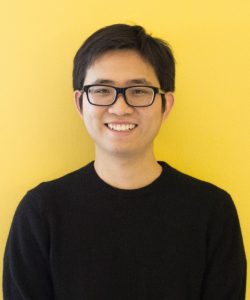Nanotechnology at Northwestern
Meet Shikai Deng, a postdoctoral fellow in the Odom Group
December 03, 2020
Shikai Deng is a postdoctoral fellow in the Odom Group, which focuses on controlling materials at the 100-nanometer scale and investigating their size and shape-dependent properties.

Where are you originally from?
I am from Hengyang, China. I got my bachelor’s degree at the Beijing University of Chemical Technology.
When did you first become interested in chemistry, and how did that lead you to your current work on nanofabrication?
In ninth grade, when I started to take some classes on basic chemistry. I was attracted by the fact that chemistry solves problems at the atomic and nanometer scales. One of the beauties of nanofabrication is the ability to precisely design and make nanoscale objects or devices, and further, to discover new phenomena, properties, and applications.
How do you explain what you study to non-scientists?
My research focuses on materials with very small features in the scale of a nanometer, which is thousands of times smaller than the thickness of a piece of paper. At this scale, the properties of materials are dramatically different from their bulk equivalents.
I study the design of nanometer structures with different materials. How can these structures be used to tune the properties of materials? For example, how does electricity flow in materials with nanoscale wrinkles? I also study their interactions with their surroundings, such as how light can be trapped and manipulated in the nanoscale.
You were recently awarded a Cottrell Fellowship from the National Science Foundation and the Research Corporation for Science Advancement. What does this fellowship mean for your work? What are you most excited about in your current research?
The Cottrell Fellowship supports my current research at Northwestern, covering my salary, benefits, and research-related expenses. It also supports me to teach an undergraduate course in the Department of Chemistry, which allows me to gain direct experience as a primary instructor. It also gives me practice balancing research and teaching. So it helps me prepare to transition to being a scholar-educator.
I am very excited that my research on designing nanomaterials has great potential to tackle unsolved global issues, such as the development of more efficient electronic devices and the conversion of solar energy to hydrogen for clean energy.
What has been a highlight of your time at Northwestern?
Being recognized with the Outstanding Researcher Award at the IIN and receiving the Cottrell Fellowship were highlights for my research at Northwestern.
What has been the most challenging aspect of your work or your time at Northwestern?
I plan to start my independent research after finishing my postdoctoral training. It is challenging to move to an independent position because of hiring freezes and cut-backs during this ongoing pandemic.
Can you tell me about your experiences either being mentored or mentoring others?
I got great training on doing research at Northwestern. My advisor Teri Odom has mentored me on how to write a clear and technically sound research paper for specific or broad readership, and how to lead a research group.
What are your hobbies outside of the lab?
I like hiking and watching sports in my spare time.